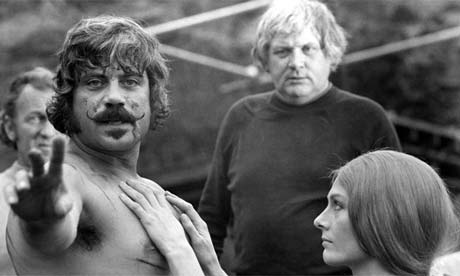The University of East Anglia, renowned for its English literature department, decided earlier this year to shut its school of music.
There was considerable protest, along with representations from the likes of National Theatre chief Nick Hytner and Brian Eno.
In vain. The university has now endorsed its original decision. Read more here.

One of the Dutch orchestras threatened with exinction by 50% government cuts has rallied some of the country’s best-known pop singers to support its survival with a protest track. Amazingly, the song has just gone to number 1 in the singles charts.
Read all about it here and watch the video here.

Kurt Nassau was a gems expert in New Jersey. He invented patents and bought and sold precious stones. He was, as they say, comfortable.
When he drew up his will, he stipulated that his entire fortune was to be left to his favourite orchestra – you know the one, the symphony, what’s it called.
So the lawyer wrote down ‘the Israel Symphony Orchestra’.
Now, the Israel Philharmonic Orchestra – claiming to be the country’s best known – is fighting the Israel Symphony Orchestra, based in Rishon Lezion, for whatever’s left of Dr Nassau’s estate once the lawyers have taken their fees. Report here.
Verdict: next week.
Moral of the story: make sure you know which orchestra you follow.

or

The Radiological Society of North America has been told that one of its key diagnostic tools, the high-tech CAT scanner, has been successfully used in the design of that elusive object, a premium Strad, the equivalent of which is worth $6 million and more.
Apparently, Minnesota radiologist Steven Sirr slipped his practice violin into the machine in between patients and was amazed to see the detail recorded. Over the next few years, he and a colleague repeated the experiment with hundreds of working fiddles until they finally dared to let the CAT loose on a borrowed Strad. With the data retrieved, they assisted a luthier in producing an exact, rich-sounding replica.
Here’s the triumphant report.
Just one cavil: how many patients were kept waiting – and how many refused scarce CAT scans altogether – while the consultants and physicians were playing at being medieval instrument makers?

And it’s not just happening in Minnesota. Here’s another recent report on the musical misuse of medical equipment. Ethics, anyone?
The Spanish papers are full of José Carreras again, writes our Social Correspondent, but for all the wrong reasons.
The least of the Three Tenors has split up from his second wife, air hostess Jutta Maria Jäger, ‘by mutual consent’.
Read all about it in El Pais.

The conductor Paul Mann shares his experience of the reckless talent that was Ken Russell:
So sad to read about Ken Russell. He was a hero of mine. Often that shock of white hair was to be seen on the front row of the concert hall in Poole for Bournemouth SO Concerts, including for an Elgar 2 of mine. I remember feeling all the way through that performance that it was all for him, as thanks for that wonderful old BBC film… My first job, in the early nineties, was as a company pianist and conductor for Northern Ballet. At one stage, Christopher Gable was going to get Ken to direct a Dracula ballet. It never got off the ground, but he had a great idea for how the show should open…It would start as a normal ballet, with dancers in tutus and Giselle-like music. Then, when it had gone for slightly too long and people were starting to wonder about the Dracula ballet they thought they’d come to see, one of the dancers would fall over very badly and start bleeding profusely. The ASM would come onstage and ask the audience if there was a doctor in the house. At that moment, the lights would change, there’d be a screech from the orchestra, and Dracula would stand up in the audience. Typical Ken, and such a regret that it never happened!

(from Ken’s 1988 film, The Lair of the White Worm)
Ken Russell, who died yesterday, cheerfully disavowed the constraints of authenticity when making his epic film, Mahler.
He was not bothered by whether Alma was telling the truth in her memoir of Gustav. ‘She tells a good story,’ he decided.
Nor was he troubled by location. ‘I shot it in six weeks, half in the (English) Lake Disctrict, half in a flat in Portobello Road.’
To make Mahler’s family sound more Jewish, he had them speak in London East End accents.
‘I can’t read music and I don’t speak German,’ Ken declared proudly to me.
So far, so fake.

But what could not be denied was Ken’s passion for Mahler and his music. He was consumed by it, absorbed, besotted. Music was Ken’s driving motivation and his use of it in the film is inspirational.
Klaus Tennstedt, the most instinctual Mahler conductor I have known, called it the best film he had ever seen about music and watched it over and over again. When opera houses asked him to conduct Strauss, he named Ken as his preferred director. When they refused – on grounds of Ken’s turbulence and notoriety – so did Klaus. They never worked together, but they met several times and enjoyed each other’s company.

The Grawemeyer Award, the richest prize for contemporary composition, is greatly coveted by all who put notes to paper. Apart from the prestige, there’s $100,000 in an envelope, which is more than most living composers see from their work in a decade.
This year’s winner has just been announced.
It is Esa-Pekka Salonen for his violin concerto. Here’s his victory interview with Alex Ross.
Would you say the Salonen violin concerto is the best new work of the past year? Listen here. You judge.

My singer friends inform me that Ubaldo Gardini, one of the great voice and Italian language coaches of the past half century, died yesterday in hospital in Ferrara.
Here’s a tribute by Sir Colin Davis, who called him ‘maestro’. Mark Elder, in an interview, once named Gardini as the man from whom he had learned most.

A member of the family has just informed me that the film director Ken Russell died yesterday afternoon, peacefully in his sleep.
He was 84.
Ken made his name with a series of films and fantasies about great composers: Elgar, Delius, Mahler, Liszt and more.
He went on to make feature films – Women in Love (1969), The Devils (1971) and Tommy (1975), always with an assertive music component and an uncomplicated narrative line.
Among many achievements that spring to mind, he made British cinema less insular and self-referential. He was also a leading creative force in the history of British television.
He will be widely mourned.

photo: (c) Everett/Rex (all rights reserved)
A report from Slipped Disc correspondent Jonathan Elvey:
Here in Athens this week we were reminded for the umpteenth time of
the unique ability of music to inspire,nourish and console. You can
imagine how regular culture has all but disappeared here at the
moment, and our lovely concert hall, the Megaron, is dark and empty most
nights. But a couple of weeks ago Peter Wispelwey held our chamber
hall regulars spellbound when he came to play all six of Bach’s cello
suites over two concerts in one evening , and some 80 % of us were
there for the whole thing. Maybe that’s not surprising for a
specialist gig in a small space. But this week, not only was the main
hall think RFH stle and capacity – virtually full two nights running
to see the Concertgebouw with Andris Nelsons play Petrushka – like me,
many of the first-nighters came back the next night to listen all over
again to this wonderful orchestra play music which in the right hands
sounds as fresh as the day it was written. A small reminder of the
better things in life when we are dealing with some fairly tricky ones
most of the time.
Jonathan Elvey

Nico Schilder has written to me from Holland with what purports to be the ultimate guide to classical radio stations online. I haven’t browsed too far afield yet, but the research is impressive and if you feel a pressing need to catch up with what’s playing in Latvia or New Zealand, this is the place to go: http://www.classical.dj/europe.html

Colin Eatock, the Canadian writer, despairing of finding a trustworthy guide to classical blogs online, has compiled his own. It is astutely divided into categories: composers, independent views, music business, music magazines, newspaper critics, performers, presenters, scholars. So many, in fact, you’d have to take a week off work to read them all – and that’s just the English language converage. The list is here: http://classical-music-blogs.weebly.com/index.html
Thanks to both of these dedicated compilers. I should bookmark the two urls.













